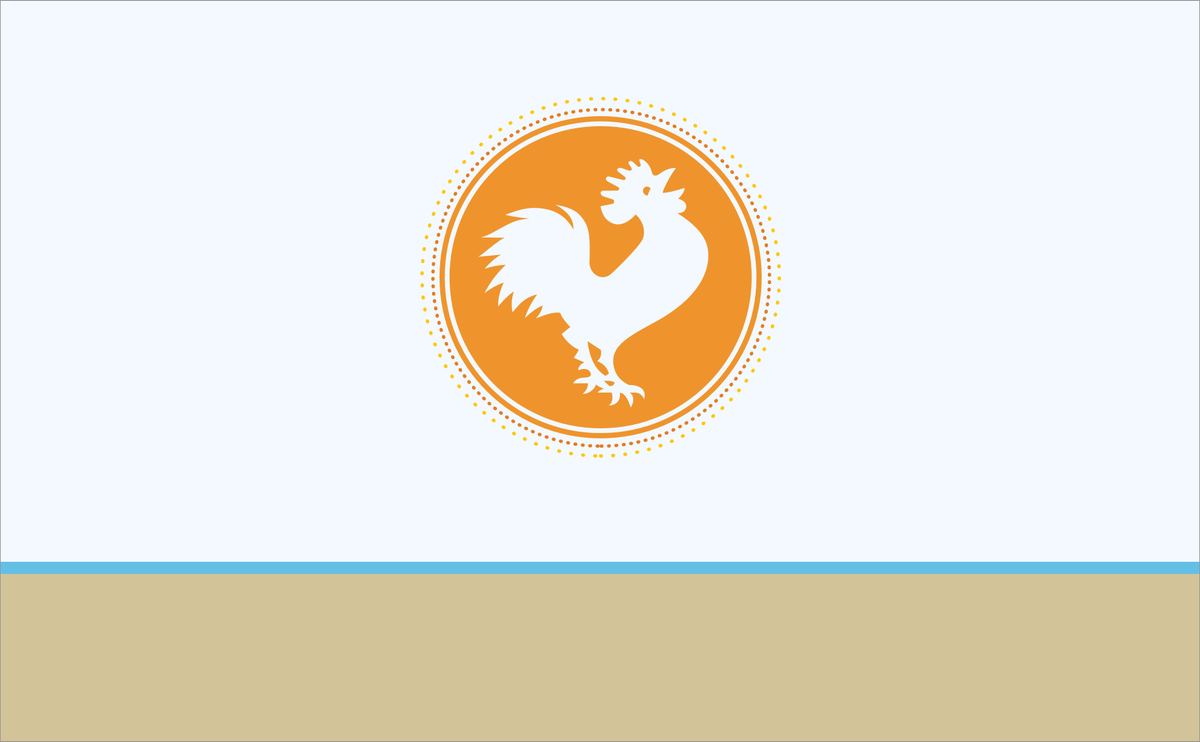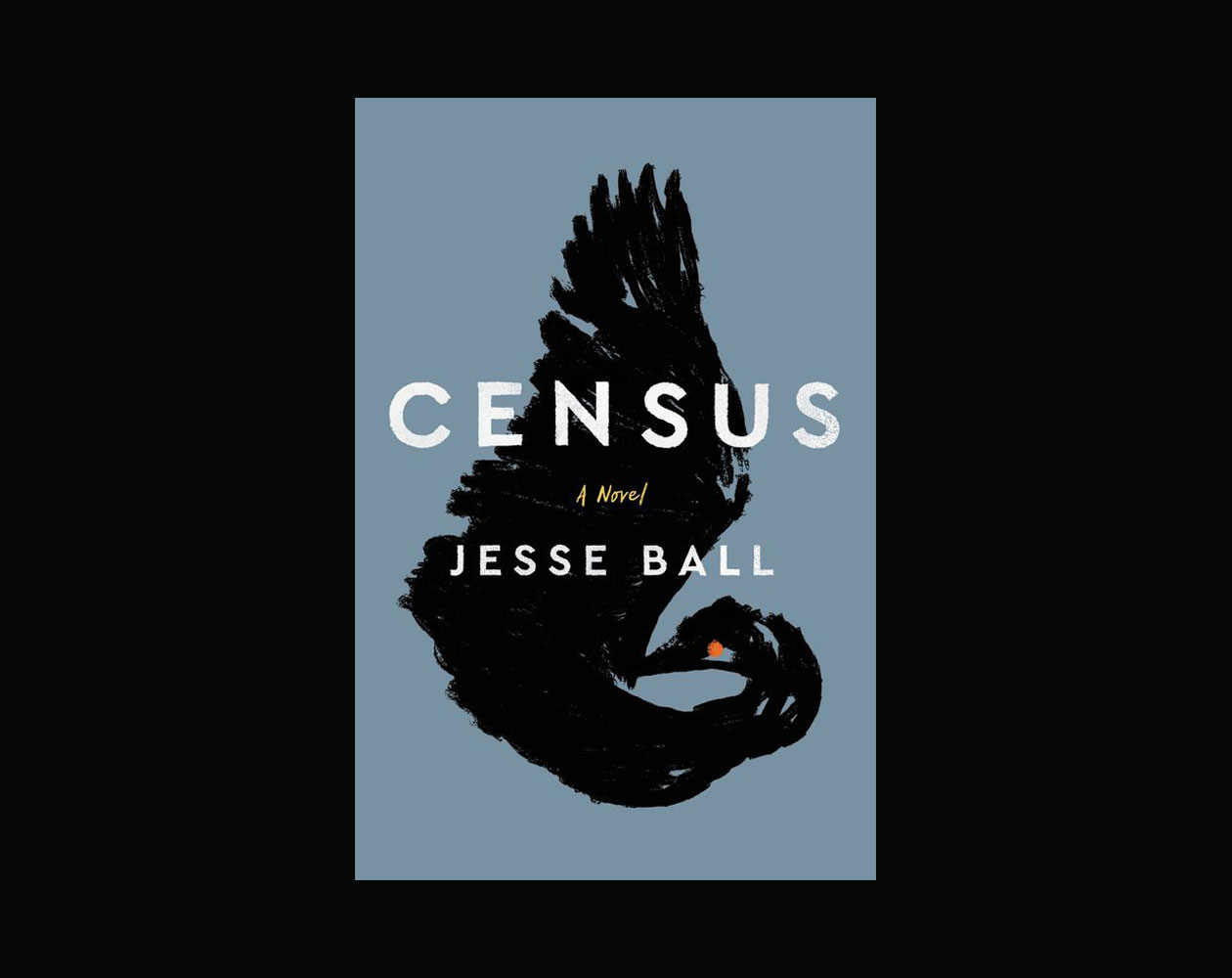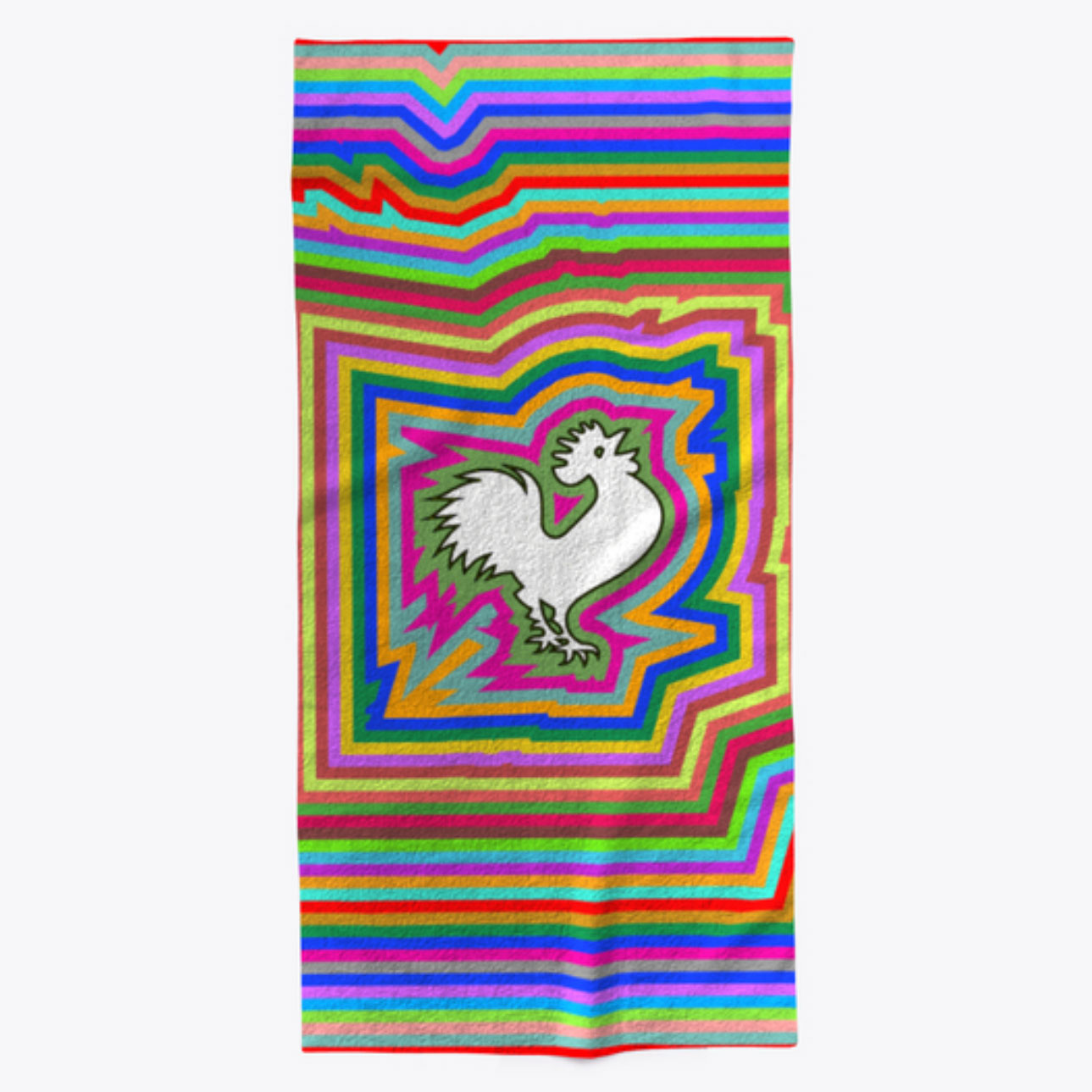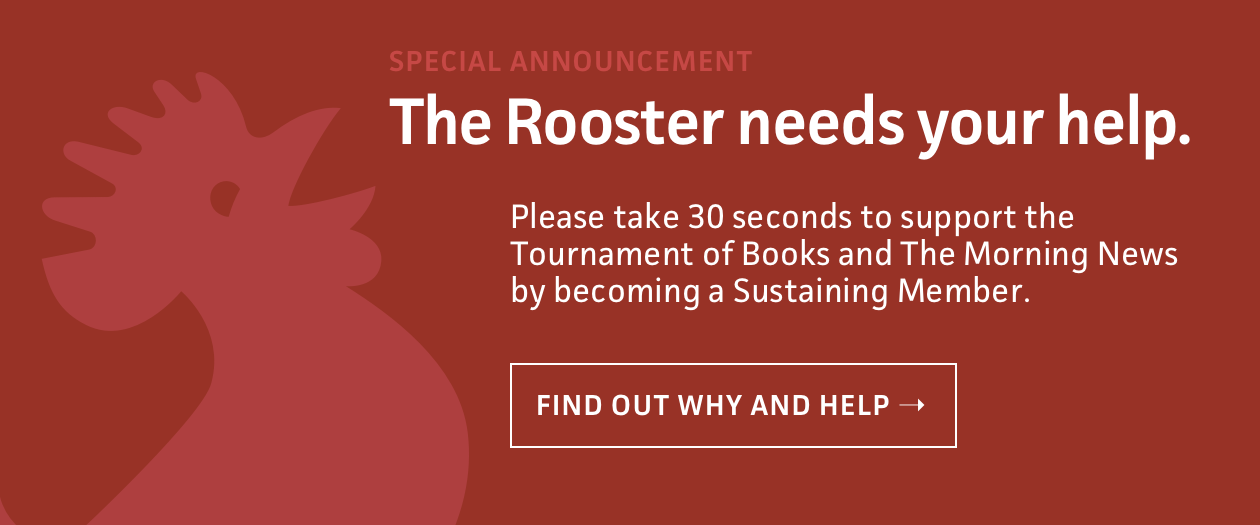The 2018 Rooster Summer Reading Challenge: Week Eight
We wrap up our July reading with the conclusion of Census—plus, this month's judges, Kelly McEvers and Nathan Deuel, make the call on which book heads to our end-of-summer finale.

Welcome to the 2018 Rooster Summer Reading Challenge. We’ve selected six Rooster-worthy works of fiction from 2018 to read through August—two per month—and once a week we meet here to discuss our reading progress.
Each month we’re joined by a new judge, who discusses the books with us and then selects which of that month’s two books heads to our summer finale—where you, the readers, decide which novel wins the 2018 Rooster Summer Reading Challenge and an automatic berth in the 2019 Tournament of Books.
(Which kinda counts for a lot, seeing how our 2017 summer winner, Fever Dream, stampeded through the 2018 ToB, eventually taking home the Rooster. By the way, if all of this is new to you, check out this Rooster primer.)
To select our summer books, each of our judges chose a work of fiction they were particularly excited about this year. The other three books were selected by the ToB Committee according to our normal criteria—novels first published in English in the calendar year that we feel are excellent and interesting. (To avoid conflicts, none of the judges were assigned the books they selected personally.)
A special thanks to our Sustaining Members for making another year of the Rooster Summer Reading Challenge possible. Find out why The Morning News and the Tournament of Books depend on your support, and please consider becoming a Sustaining Member or making a one-time donation.
This month we’re reading Circe by Madeline Miller and Census by Jesse Ball, with Kelly McEvers and Nathan Deuel.
- See the reading list and discussion schedule
- Catch up on previous chats: Tomb Song (first half, second half), American Marriage (first half, second half), Circe (first half, second half), Census (first half)
- Jump into today’s discussion in the comments
Please note: We receive a cut from purchases made through the book links in this article.
Andrew Womack: After our last discussion, I was looking for answers in the book’s second half, and I’m certainly satisfied with what it delivered. In broad strokes: The father and son continue their journey from town to town, as the father’s health erodes further, and eventually he puts his son on the train back home, and the father dies.
And, wow, talk about some metaphors. I’m actually sort of glad I didn’t pick up on much of them in the first half, because Census is about life and its mysterious forces, and your ability—or lack thereof, in my case—to see the world for what it is. In keeping with that, the fact that I was dumbfounded for so much of it seems entirely appropriate, though I don’t think that’s Ball’s intention. Perhaps I’m just really the target for this book—that is, I was so easily distracted by the micro-narratives that I wasn’t paying attention to the whole, so the book’s denouement really was a reveal for me.
Kelly McEvers is the host of NPR’s Embedded. Nathan Deuel is the author of Friday Was the Bomb: Five Years in the Middle East.
Andrew Womack is a founding editor of The Morning News.
Nathan Deuel: I, too, feel like a target for the book—but maybe not the target? I was thinking about how Kelly really responded to the menacing question of the state in this portrayal of a society that seems more than a little broken. I, meanwhile, found myself much more drawn to the individual human dramas: the kindness or cruelty of one man, the generosity or violence of another, all of which the man and the boy must endure. I also really loved the haunting figure of the mother, that weird clown, and her fame, and also what feels like the book’s heart to me—that none of its fragile beauty could have been possible or come together in this exact way, without the boy.
Kelly McEvers: I had so many questions going into the second half—and yes, many of them were about the state and this “war” that seemed to have happened in the recent past—and very few of my questions were answered. But I didn’t care! Instead of pushing forward and building out a world, Ball chose instead for the narrator to look further into his past, as humans do at the end of life. And so new questions were born and answered, and unanswered.
Andrew: Well put. We let go of our need for answers or tidy endings; the father lets go of his son (and more); everyone must let go, eventually.
For me, it was around the beginning of the second half where the signals about the larger metaphors the book was playing with began showing themselves. The landscape they travel into becomes more and more withered and poisoned, the people they meet more brutal—as death overtakes the father.
Kelly: Andrew, that’s so interesting. I was paying such close attention to the people they met, and yet I didn’t see an arc of brutality as you did. I was just so keen to pick up on any hints, like the man who had killed so many people in the war it didn’t really matter how many, or the fact that they reached a point where the factories ended. To me that meant the end of man’s plan and the beginning of a natural world over which they had even less control. And I also loved that as they drove on, the census itself became less and less important, suggesting that it was after all just a job.

When a widower receives notice from a doctor that he doesn’t have long left to live, he is struck by the question of who will care for his adult son—a son whom he fiercely loves, a boy with Down syndrome. With no recourse in mind, and with a desire to see the country on one last trip, the man signs up as a census taker for a mysterious governmental bureau and leaves town with his son. (Amazon / IndieBound / Powell’s)
Book description excerpted from publisher’s summary and edited for length.
Nathan: See, I didn’t pick up on the metaphorical significance of the father’s failing health so much, nor did I key into the idea that the more distant sectors contained people that were more withered. I suppose I saw the latter more as a function of the later chapters’ remoteness, the way a hardy sort of difficult people would choose to live in them, so far away from the center. I admit I kind of pictured the man and his boy driving west, maybe along Route 50, my favorite road in America, which goes from Ocean City, Md., to Sacramento, Calif. That same drive might offer a similar feeling of becoming untethered—not traveling toward some poisoning, though if you’ve ever driven on 50 through Nevada it can feel like something bad has happened and everyone is dead or dying.
Andrew: I once took a wrong turn off I-10 near Tucson and thought I’d wound up in the backlot of The Walking Dead. My driving companion swore he saw a hand stuck to a fencepost. (We stopped. It was a glove.)
A line in the second half of Census that really stuck out to me was when they meet the woman who had a daughter with Down syndrome, and she says, “I think there are so few people in these later days who care about the kind of person they are.” As I was saying before, those “later days,” I felt, applied to the father. But before I really caught onto the metaphor, and was looking for a more overt plot, I applied the phrase to society at large. Now I’m wondering if they’re all one and the same: the narrator, society, the landscape, all dying and separating from the precious and good and knowledgeable, represented by the son.
Kelly: That scene with the woman was beautiful. I wept when I read these achingly simple lines: “Some people were cruel to her, but here, something grew. It was a fine place for her to live, and when she died, she was missed.” Looking back, I realized this scene signalled how the second half of the book was going to live up to the promise of Ball’s prologue, the author reconsidering his own relationship with his brother. And the world’s relationship to his brother. Had I not read this intro, I would’ve felt differently. But it’s at this moment that the book almost seemed to become a memoir, in a Maggie Nelson kind of way.
Nathan: I am big-time the target audience for books that ask us to wonder if certain people are paying attention, and a suggestion that maybe others aren’t, and often the answer is not exactly. Indeed, there’s often the feeling that thinking one section of people is somehow more keen and sensitive is actually a dangerous way to go. That’s one reason I like to travel (we’re currently on the island of Bute, in Scotland) and also I like teaching. With both activities I am often inclined to be smug about my people radar, to feel like I have such a fine sense of who is good and who is not. But I’m pretty much always wrong. I’m not saying there aren’t bad people. When I read the line, about the “few” who “care” I feel two contradictory things happening. First, I think, yes, absolutely, the characters in this book are hurtling toward a bleak future and so are we. But then I think, no, there’s always an ambient level of good and bad and it’s dangerous and wrong to think any one period is any more enlightened than any other. Neither, almost certainly, is entirely true, and I think the ending of this book leaves us probably less comfortable than a more simplistic book might have.
Andrew: Doom all around! And with all the dread heading into the final chapters, the part with the waitress who delivers the “no regrets” line was a necessary laugh-out-loud moment for me.
Now she had to do all kinds of things she didn’t want to do. But did she regret it? No, she did not regret it. She had read a book once, one of her aunts gave it to her, it said, have no regrets, never have any. So she never did. She took it literally, she explained—she, as a girl, thought that it meant, don’t let yourself regret things, rather than, go out and do the thing that you long to do, so you don’t regret not having done it. She took it the other way, and in fact, to her mind, the other way is the way to take it. It’s the better principle, on the whole. Anytime you think you are about to feel regret, just think about something else. There are plenty of things to think about, aren’t there?
At the same time, I see how that section fits into the larger theme of what you witness—or don’t, or refuse to—in life. But still, that bit is going to stick with me. Is it possible this book is going to make me live a better life?
Kelly: I was very puzzled by that. I have no answers!
Nathan: Cruising around Scotland, plunging into icy waters and slurping down various bivalves, I have often thought about the lightness of this book, and the way the mom is a clown. I think about the method and power of the tattoos. I savor the canny way a boy can move through the world, and the way he and his father can challenge us to try to be good.
Andrew: No regrets, Kelly and Nathan, no regrets. What’s your interpretation of the final section, where the father envisions his son disembarking from the train, and meeting possibly his grandparents (who we already know are no longer alive) or him (rapidly dying)?
Kelly: I could not help but think, oh, it’s actually the son who is dying, and going off to meet his grandparents and his mother in the afterlife, and the father is the one who has to go on. The train is death, the ditch is life.
Andrew: Oh now that’s certainly a new twist. (Definitely want to hear what the commentariat thinks of this!)
Nathan: I think part of being this father (or any father) means having to believe that everything will be OK after you’re gone. This might be one of the more cruel messages of this book. That to have a really fragile son is to be given this gigantic gift, this obligation to be kind, this daily object lesson in the difficulty and beauty of treating the weakest among us with respect. But! All your kindness, all your hard effort, all that patience—it will be erased. It will be erased by time, by your own death, by the punishing and relentless cycle of life, which cares not at all about that one day you were really nice to your boy with special needs. The father has to hope his son will be OK but he also knows deep down that the boy is as doomed as the rest of us.
Might the book be saying, in a sly way, that writing any of it down is one flawed but potent way to fight the power of decay?
Andrew: Let’s hope so? As a parent, I find your interpretation particularly devastating, because it is accurate and because all I have is hope that my children will be OK. I fear—always—I’m not doing enough for them, and I’m not sure I’ll ever be ready to let go.
All in all, this book really moved me, and the end was riveting. I’m going to need to read it again to see what new things I can glean from it. I almost feel as if it’s one of those books designed to facilitate that kind of experience. It’s a quick read, but it’s not an easy one, and there’s something to be said for a challenging work that invites you to try more than once.

The Infinity Rooster finds its way to your beach chair, with a towel you could spot from the breakers. New batches print every three days—order yours now. As a reminder, Sustaining Members receive 50 percent off everything at the TMN Store. To find out why we’re asking for your support and how you can become a Sustaining Member, please visit our Membership page.
Kelly: I very rarely read books twice. There are too many books! But I did find myself savoring sections, going back, flipping forward, folding pages down to check them out again just before I fell asleep. Some sections were novellas by themselves, and it was delicious to take them in slowly, as you say.
Nathan: I love to revisit books and there are some I read almost every year, The Quiet American probably being among my very favorites. The way I read that book when I was 20, going to Southeast Asia for the first time, versus reading it as a young editor in New York, and then a new father living in the Middle East—they’re all such profoundly different experiences. I used to be somewhat embarrassed by the fact that when I read, I’m trying to find myself in a book, to find clues about the kind of person I have been, could be, and maybe should be. Another wrinkle to all this is the way I’ve become, more and more, a teacher of writing. So part of that search for direction is now a layer to my reading that is wondering how I can teach this book. Census, would, I think, be a fantastic book to read with a room of young students.
Andrew: Sign me up.
And now it’s time to decide which of our July books—Circe or Census—you’re sending to our August finale, where our readers will ultimately decide which of our three Rooster Summer Reading Challenge finalists wins an automatic berth in the 2019 Tournament of Books. So, which one will it be?
Nathan: As I said earlier, I never would have picked up a book like Circe, but I’m so very glad I did. The first half was such a lush and enchanting portrayal of immortals acting immoral, so to speak—
Andrew: Nice.
Nathan: —and I was completely riveted by the question of what would happen to our main character. Things slowed down in the second half, a portrayal of months and years rather than centuries and eons. I was, three-quarters through, poised to absolutely love that book. But I do, in the end, feel let down by what felt like a fairly saccharine conclusion.
Kelly: I definitely vote for Census. I have already recommended it to a handful of friends. I tell them its Coetzee meets Calvino meets McCarthy, even though those are all men and I do like to root for the home team. It’s funny, we are visiting a friend in southwest England who has a copy of Circe and says it’s next on his list of books to read. I don’t feel so strongly about the book to tell him not to do it. But if he asks, I’ll say it’s a clever re-imagining of a Greek goddess/nymph/magician, if you’re into that sort of thing.
Andrew: I am! Not to sway the jury, of course...
Nathan: In the end, it’s not hard for me to agree with Kelly. Of the two, Census feels like the more rigorous and memorable project. I already knew Jesse Ball was one of the most interesting and talented writers of his generation, and now I have even more evidence to support that claim. It’s unanimous! Everyone get out there and read some of his books!
Andrew: There we have it! Another month of the 2018 Rooster Summer Reading Challenge is in the books with our July winner, Census by Jesse Ball heading into our summer finale on Aug. 22, where it will face our winner from June, An American Marriage by Tayari Jones, and our as-yet-undecided winning book in our August matchup: Kudos by Rachel Cusk versus The Friend by Sigrid Nunez.
And to make that decision, next week we welcome novelist and Books Are Magic co-owner Emma Straub, who will be in conversation all month long with Nozlee Samadzadeh, our ToB producer. We’ll see you on Wednesday, when we’ll be discussing the first half of Kudos, through page 122.
Subscribe to the Rooster newsletter
You will receive email from The Tournament of Books. Opt out at any time. (View our privacy policy.)

